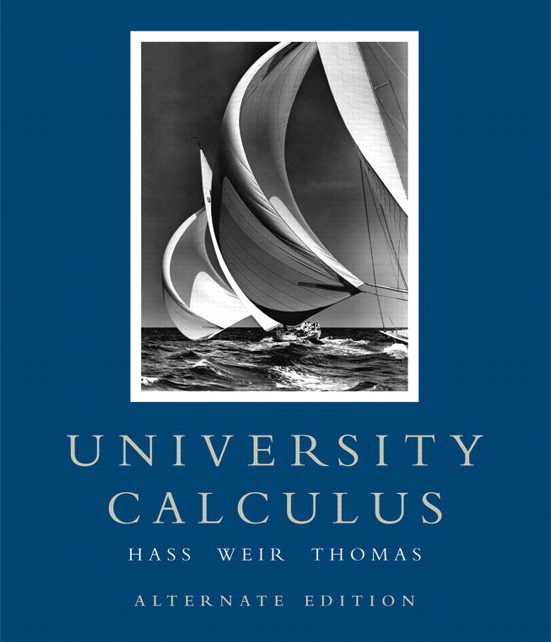
University Calculus. (Photo: math.UCDavis.edu)
Calculus Is Canceled: A Legacy Betrayed?
Rather than lifting students up, the establishment’s manifesto calls for teaching down
By Robert Wood, June 21, 2021 2:45 am
Cancel culture has come for calculus. After decades of student activism and the work of educator-activists dedicated to raising academic rigor, their hard-fought battles have resulted in a greater cross-section of students having access to Advanced Placement courses. However, officials in several states have been considering changes to the curriculum that represent a huge step backwards: discouraging students from taking advanced math courses.
While proposals have been floated in several states, California has moved the closest towards adopting new standards discouraging the teaching of advanced mathematics, particularly the instruction of high school calculus. The document contends, among other things, that teaching high school students calculus is not a realistic goal. It is ironic that the California state board of education seems to be unaware of California educational history. This is apparently the case considering that the assertions and assumptions made by the 2021 framework have been disproved by the success of the Escalante Math Program in the 1980s.
This year, the California Department of Education unveiled a new framework that, among other things, asserts that high school students should not be taking calculus. The new proposal published on the California DOE website states on page seven of its eighth chapter:
“Many students, parents, and teachers encourage acceleration in grade eight (or sooner in some cases) because of an incorrect conclusion that Calculus is an important high-school goal.”
The Department goes on to describe the push to calculus in twelfth-grade as “misguided” and that the necessity of completion of Algebra I at the eighth-grade level to reach a high school calculus class as a “false belief.”
One of the takeaways of the document is that “The rapid expansion of calculus, particularly at the expense of other important mathematics, reflects troubling realities of college admission…” The contributors posit that alternative pathways are projected to “…result in much more diverse participation in Science, Technology, Engineering and Mathematics (STEM) pathways…” The authors of the manifesto clearly view teaching calculus in high school as an unequivocally bad thing, and claim that the “traditional calculus pathway” is one that “…results in highly unequal opportunities-and to very inequitable outcomes- for California students.”
Yet Jaime Escalante, an immigrant from Bolivia whose efforts in the classroom were portrayed in the film Stand and Deliver, built a calculus program in inner-city East Los Angeles that prepared students for academic and career success. Escalante compensated for his students’ initial lack of earlier preparation by establishing a seven-week accelerated math summer program at East Los Angeles College. With the support of Garfield principal and U.S. Army veteran Henry Gradillas, Escalante convinced the junior high schools in the area to offer algebra classes in the eighth and ninth grades, ensuring that students would be up to speed. The Los Angeles Unified School District (LAUSD), employed a policy of academic tracking that segregated students who were considered to be “college-bound” versus “non-college-bound.”
Academic tracking has a history of being racially exclusionary, particularly towards Latino and African-American students. Escalante opposed academic tracking would take any student who wished to enroll in his classes. Gradillas notes the following in his book Standing and Delivering: What The Movie Didn’t Tell:
“AP success at Garfield was a great example of Escalante’s model of pulling kids up. When barrio kids saw their cousins and neighbors graduating from high school with at least a semester’s worth of college credit, and they saw them going to schools like MIT, Stanford, Yale, and USC on full scholarships, and they realized that those kids were a lot like they were, they wanted a piece of the action”(Gradillas 48).
The 2021 proposal’s introduction features a declaration straight out of Kurt Vonnegut’s Harrison Bergeron:
“All students deserve powerful mathematics; we reject ideas of natural gifts and talents.”
Rather than erase the idea of talent, Escalante’s approach sought to cultivate the talent of students who had been left behind by the existing educational regimen. Gradillas writes, “AP was the perfect program for some of our bright kids whose talents had not been identified in tests.” The former principal also argues in favor of AP coursework as a unifying force, stating that “…parents, students, teachers, and administrators are all on the same side.”
The manifesto also features the following statements:
“An important goal of this framework is to replace ideas of innate mathematics ‘talent’ and ‘giftedness’ with the recognition that every student is on a growth pathway.”
20 U.S. Code 7801 defines gifted and talented in the context of education as “students, children, or youth who give evidence of high achievement capability in areas such as intellectual, creative, artistic, or leadership capacity, or in specific academic fields, and who need services or activities not ordinarily provided by the school in order to fully develop those capabilities.” Rather than lifting students up, the establishment’s manifesto calls for teaching down.
Another notable passage raises the issue of being inclusive of historically marginalized communities:
“Teachers can support discussions that center mathematical reasoning rather than issues of status and bias by intentionally defining what it means to do and learn mathematics together in ways that include and highlight the languages, identities, and practices of historically marginalized communities.”
As you might expect, the terms “Brown” and “Latinx” both surface in the document.
One would be hard-pressed to dispute the notion that throughout the history of California, Latinos, particularly Mexican-Americans, have been historically marginalized and discriminated against. One of the defining events of Chicano Movement, a civil rights movement led by Americans of Mexican descent, were the East L.A. walkouts that took place in March 1968. The walkouts were led by Chicano student activists dissatisfied with, among other inequities, the subpar quality of education in LAUSD. Gradillas himself mentions the walkouts, explaining in 1968, “Kids were asking for a better education and Chicano activists had made specific demands.”
It is also difficult to contest the significance of the work of Gradillas, a Mexican-American, and Jaime Escalante, an immigrant from Bolivia, in their empowerment of the historically disadvantaged, predominantly Latino residents of East Los Angeles. For a framework that is supposedly all about diversity, inclusion, identities, and recognition, the State Board of Education is doing Californians a disservice by ignoring Escalante’s and Gradillas’ contributions and accomplishments towards the education of marginalized communities.
Jerry Jesness’ 2002 article explores the decline of Garfield’s math program: after Gradillas left the school to complete his doctorate, several subsequent administrators were not nearly as supportive of Escalante’s program. Rather than return to Garfield, when Gradillas completed his doctorate, he was assigned by LAUSD to oversee asbestos removal.
Teachers’ unions took issue with the number of students in Escalante’s classes. A Garfield student interviewed for a documentary stated: “The union [hierarchy] used its organizing power to get [the] votes to oust Escalante as math department chairman. Escalante then quit.” Escalante left Garfield High School to teach in Sacramento before moving back to Bolivia. Following the departure of Escalante and two of his proteges, there was a “sevenfold drop” in Garfield AP students passing the Calculus exam.
While the politics of LAUSD may have hampered the long-term reach of the Escalante Math Program, the success of its alumni cannot be disputed. Several of his alums became electrical engineers, attorneys, civil engineers, and mathematics professors among other occupations. One of his students was the first Garfield High School graduate to be accepted to MIT, another attained an internship at NASA’s Jet Propulsion Laboratory. Jesness writes that at the national level, Escalante’s program has been credited with increasing the popularity of AP classes. In a matter of four decades, Escalante’s methods went from praised to forgotten, and California’s school authorities are now promoting the abolition of high school calculus.
Conclusions
A little over ten years ago, American Federation of Teachers president Randi Weingarten released a statement stressing the importance of maintaining America’s competitiveness in the world: “President Obama’s goal to recruit 10,000 new science, technology, engineering and math (STEM) teachers over the next two years is an important step toward preparing students to enter the global knowledge economy.”
The union head also noted that “Any good recruitment and retention effort, including this new STEM program, must be implemented carefully and developed at the local school-district level—with teachers and administrators working together to get the details right for their students and to ensure that it recognizes and encourages all teachers.”
It’s notable that the Escalante Math Program began its existence roughly a decade and a half before the STEM acronym was even coined. Is a statewide framework opposing high school calculus that denies the existence of gifted students a better approach than a local high school’s partnership with a community college to instruct STEM subjects?
Weingarten is a well known ally of the Biden administration, and it has been suggested that Biden is using California as a model for his policy agenda. Some say that California is America’s future-but is this the California of Jaime Escalante and Dr. Henry Gradillas, or California’s anti-calculus educational establishment?
The 2021 framework is set to be voted on this November by California’s State Board of Education. As America’s global competitive edge with rising totalitarian powers like Communist China increasingly depends on student success in STEM, programs like Escalante’s should be embraced, not forgotten.
- Calculus Is Canceled: A Legacy Betrayed? - June 21, 2021





The people making these decisions are jealous because political science isn’t considered a STEM major.
Hispanics need to stand up to white liberals and communists. Whites didnt and here we are. Someone has to care about thier children.
Keep ’em dumb. Common Core couldn’t adapt with Calculus, so get rid of it.
I wish I had high school calculus. I had to wait until college. In a world where math is racist I suppose we should start purging math at kindergarten.
And, the rest of the world is giddy, beside itself howling in gut-wrenching laughter at their good fortune…including all of Asia, Europe, and even some parts of Africa! AMERICA: Where an entire nation intentionally self-immolates!
I’m curious to know how people who aren’t professional mathematicians, scientists or engineers actually use calculus. The usual argument for preferring descriptive high school science classes over hard-core analysis is that it will encourage students to take up STEM when they get to college.
It’s more the training to teach one to THINK deductively and inductively, rather than the pure application of the discipline, although it will then open doors into more advanced STEM fields once that thought-process is learned.
@CD9 Of course the training has value, especially to the extent that it encourages abstract thinking. The issue is that typical freshman calculus topics focus on learning how to construct problems and apply differentiation and integration transformations to solving them. In the modern world, however, far more actual problems get solved by abstracting to numerical models rather than to analytical ones. With modern software and visualization tools, a student is able to connect abstract modeling with immediate feedback. Evidence is that students learn abstract thinking more effectively through numerical modeling, with calculus added in later.
So it doesn’t make as much sense to teach calculus to high school students for the sake of “learning to think” because there are other topics that get them there more quickly.
Question stands,… does anyone outside of STEM actually use calculus in life? It doesn’t seem likely, when research and modeling skills are more important now, even to STEM professionals.
This also points to my concern with the “calculus is canceled” headline and the way people respond. Older people often focus on the way they learned to navigate the world, and they don’t realize that the world has changed.
Rob Wood, thank you for such an informative article.
@Lydia: Frankly, I consider the article misleading because it doesn’t address the actual findings and reasoning behind the recommendations. It’s hard to know whether the author doesn’t understand the material in the report, or is deliberately deceptive to support his own political (not educational) agenda. Just look at the many earlier responses by uniformed readers who think somehow learning mathematics other than calculus is a communist plot to “keep ’em dumb.”
Are the “uniformed readers” wearing Boy Scout uniforms or are they “English uninformed” like some of the sloppy writers on this blog?
It’s not just about keeping them “dumb”. It’s about keeping them POOR and out of power. It’s to ensure that the lower classes, of all races, STAY lower classes. What we have in the US is not systemic racism…..what we have is systemic CLASSISM.
great article
California is attempting to mimic the Beavis & Butt-head episode where the two morons are kicked down to the 4th grade classroom for being . . . morons. When asked a simple math question by the 4th grade teacher:
“Butt-head: Uhhhh… I’m, like, angry at numbers. Beavis: Yeah, there’s like, too many of them and stuff.”
I was always terrible at math and hated it. Nor have I ever really used advanced math in my real life. So I do NOT have a pro-math bias. But I firmly believe all children should have access to higher math courses, regardless of native individual ability, as that is the avenue to better paying jobs. Preventing all kids from having this access guarantees that they will stay, as individuals and a group, in a lower socio-economic status. And….isn’t that really the POINT?
Calculus might be a bridge too far. Schools aren’t even teaching basic arithmetic now! Congress passed a Bill adding $5600 to the National Debt for every man, woman and child in the USA – but gave most adults $1400 – and everyone thinks that’s a GOOD DEAL!!!
#innumeracy